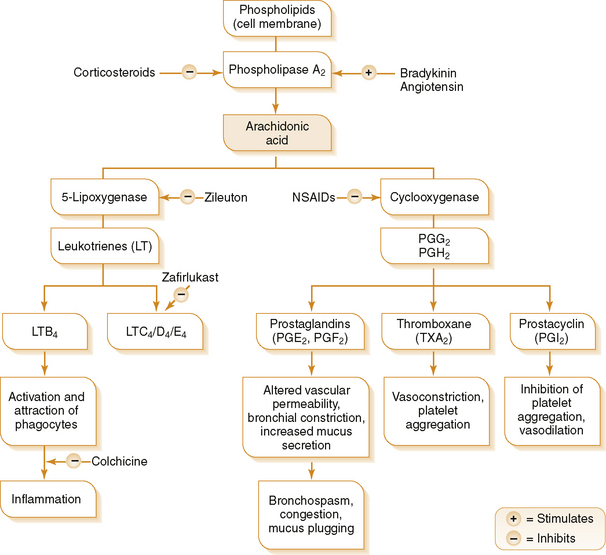Chapter 18 Nonsteroidal Anti-Inflammatory Drugs and other Nonopioid Analgesic-Antipyretic Drugs
1. These drugs primarily inhibit cyclooxygenase (COX), the enzyme responsible for the first step of prostaglandin synthesis.
1. Aspirin (acetylsalicylic acid), the prototype NSAID, is the standard against which all other NSAIDs are measured.
BOX 18-1 Nonsteroidal Anti-Inflammatory Drugs (NSAIDs) And Other Nonopioid Analgesics
a. Many effects of aspirin are due to irreversible inhibition of prostaglandin synthesis through acetylation of both COX-1 and COX-2.
• Prolonged bleeding time but no change in the other coagulation indicators (e.g., prothrombin time [PT], partial thromboplastin time [PTT])
• Inhibition of thromboxane A2 (TXA2) synthesis (potent platelet aggregator and vasoconstrictor) via irreversible inhibition of platelet COX-1 that lasts for the life span of platelets (see Chapter 16)
a. Acetylsalicylic acid (t1/2 = 15 min) is enzymatically and rapidly metabolized to salicylic acid (a reversible inhibitor of cyclooxygenase).
b. When conjugation pathways become saturated, small increases in the dose of aspirin can produce relatively large increases in plasma salicylate levels.
d. High dose of aspirin (>4000 mg) gives zero-order kinetics, t1/2 greater than 12 hours (salicylate)
b. Salicylism (tinnitus, vertigo leading to deafness) with overdose (see Chapter 30); reversible with dosage reduction
(2) Respiratory acidosis due to eventual suppression of the medullary respiratory center may also occur as a late finding.
(1) Possibly due to decrease in prostaglandin E2 or I2 production (vasodilators of afferent arterioles)
Stay updated, free articles. Join our Telegram channel

Full access? Get Clinical Tree




